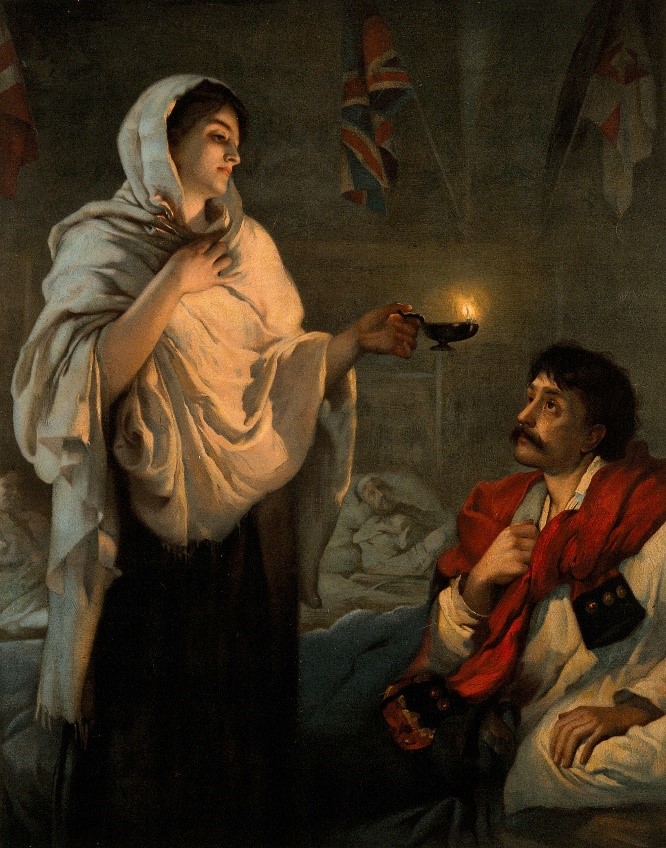
TO FLORENCE NIGHTINGALE
Lady! in our England’s story
There are names we proudly say –
Names of women writ in Heaven,
With us still, and passed away;
But in all the shining record
Which the angels love to read,
Few can claim the earnest homage
By our hearts to thee decreed.
Lady! when to weeping households
Word of thy devotion came,
High and lowly called thee angel,
Wives and mothers blessed thy name;
Where the rectory roses cluster,
Where the whitened cottage peers,
In the old manorial mansion,
Eyes were filled with thankful tears.
Lady! when the wounded soldier
Lifts his head and looks on thee,
Hope will come and softly whisper
He may yet re-cross the sea;
Yet return his mother’s kisses,
As she shudders at his scars,
Yet behold a face still dearer
Seen in dreams beneath the stars.
Lady! thou hast left, for duty,
All that gives to life its charm,
And we pray that God may keep thee
With thy sisters safe from harm.
Ever shall thy name and story
Cause the heart a blissful thrill,
When our warfare is long over,
And we all are lying still.
S.
This somewhat mawkish eulogy appeared in the newspaper founded eight years before by Charles Dickens. It demonstrates the rapid, dramatic effect of the arrival of Florence Nightingale had on the effectiveness of the military hospitals tending casualties of the Crimean War.
It was on this day (21st October) in 1854 that Florence Nightingale departed England with a team of 38 nurses, heading to Scutari in the Crimea, in swift response to a public call from her friend Sidney Herbert, the government’s Secretary at War who had written to her on October 15th. The letter was copied in the press – an example may be found here. Earlier newspaper reports, not least by William Howard Russell in the Times, had highlighted the poor standards of medical and nursing care then being experienced in the field hospitals
It seems strange to think in these broadly egalitarian days that it was a young gentlewoman who eschewed the life of ease and luxury that was her birthright and, in effect, created modern professional nursing in the brutal theatre of war. As Herbert’s letter to her suggests, Nightingale’s ‘personal qualities, your knowledge, and your power of administration, and, among greater things, your rank and position in society, give you advantages in such a work which no other person possesses.’ Her place as an earl’s daughter gave her a natural authority in what was then a non-professional army, to run the military hospital and choose appropriate women as nurses – no easy task. Then as now, it required resilience as well as empathy. Herbert recognised that it was a task ‘full of horror, and requiring besides knowledge and good will, great knowledge and great courage’. Perhaps unsurprisingly, the medical officers did not welcome the arrival of this new force; yet her dedication soon won their respect.
Had Florence Nightingale not answered the call, the development of modern hospitals and nursing practice might have been quite different.
Without wishing in any way to diminish her achievements (not least as my wife is a nurse), it was no small part of her story that it was covered so extensively in the press, no doubt as a human interest angle on the general war reporting. Nightingale’s return from the Crimea was reported in the short-lived London Weekly Investigator (which began life as the War Investigator) on 13th August 1856 – taking its material directly from the Morning Star. This is a typical example of ‘scissors and paste’ journalism, of course, but demonstrates the widespread interest in her and her work. Nursing standards were now a subject in the public sphere. Whatever the motivations of editors may have been – and they are not necessarily benevolent – in this case the newspapers undoubtedly helped to embed the expectations and innovations led by Florence Nightingale and which still inform nursing practice in the twenty-first century.
Attributions: Image from Wikimedia Commons, https://commons.wikimedia.org/w/index.php?search=florence+nightingale&title=Special:MediaSearch&go=Go&type=image
Poem first published in The Daily News, 21/11/1854, p.4, https://www.britishnewspaperarchive.co.uk/viewer/bl/0000051/18541121/017/0004#
I really enjoyed reading this and was surprised at how quickly the impact of her work was published in the newspapers – a few short weeks. I don’t believe that there is any doubt that her connections in society and being the daughter of an Earl was in many cases the prime motivation for the journalists. However, it was her strong leadership and communication skills combined with her vast knowledge that enabled her to tactfully but determinedly make the doctors /surgeons listen and take note of the work that she and her team of nurses achieved. This primarily involved scrupulous cleanliness, fresh air and diet in whatever ways were possible during a war. Over time nurses ceased to be the handmaidens to doctors and became clinicians in their own right with some excellent multi disciplinary teams working together. To read the interest in nursing care during the Crimean War demonstrates how the newspapers whether intentionally or not sparked an interest in nursing for so many people. This has continued to develop in various ways through all of the media forms we have today including newspapers and journals whether in paper format or online. Thank you for this Blog today when it is so pertinent.
Thank you for your detailed comment on my blog! I very much appreciate how much you’ve engaged with this. She certainly was a true inspiration and seized her moment to put the building blocks in place for professional nursing, on which so much of our modern healthcare depends. It was also good to highlight a positive contribution from the press in raising public interest about this. Thanks again.